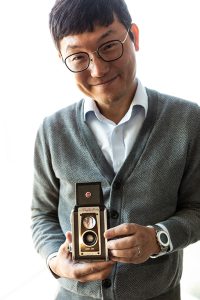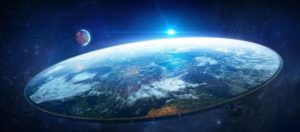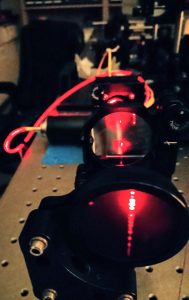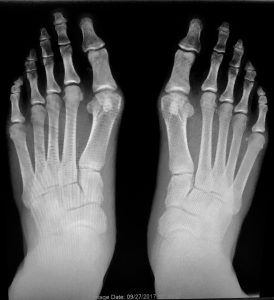A LOFT group member was accidentally spotted at the SPIE AR/VR/MR conference. Surprise? The conference was very successful and impressive. So many interesting and challenging optical design and configuration problems/topics are waiting for talented optical scientists.
13 publications by LOFT peers
It has been another exciting and productive year 2018 with all the LOFT peers. Total 13 publications have been added to the Publication section. Please, enjoy the invaluable academic contributions from the LOFT group colleagues to our optics and astronomy society. Thank you!
Dae Wook’s interview with GMTO
One of our LOFT peer, Dae Wook Kim, shares his thoughts and happiness with his research, work, and teaching at The University of Arizona. If you are interested in, please, check out his interview article in the Ginat Magellan Telescope Organization (GMTO) Newsletter or this Article. (Photo Credit: Damien Jemison at GMTO)
Round Table 2: What is your reason for doing?
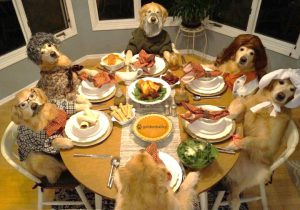
Image Source: Goldenretrieverbailey on Instagram: https://instagram.com/goldenretrieverbailey/?utm_source=ig_embed
In this round table we discuss the idea of equity and meaning behind a degree, specifically a higher education degree in optics (which I will come back to). The central question is whether or not there is a problem with the amount of work, or quality of work, behind the same degree between two people. It is assumed that this is an actual occurrence (with many anecdotal pieces of evidence offered). The conversation transitioned and two clear view points arose. On one hand, the idea that you determine the value of your degree, and outsiders values should not meaningfully impact your reason for a degree or how you go about achieving the degree. The counter view was that to some extent the college and its alumni affect one another, such as a alumni can promote or dissuade groups from hiring from your college or academic group, thus impacting your future employment. A final undercurrent throughout is the idea that there is some, undefined, threshold that students should achieve before they can graduate, although due to how hard it was to pin down this seems to be a likely culprit for why comprehensive exams, orals, and defenses are so hated; making a test that everyone agrees defines some threshold beyond which you are an expert is extremely difficult.
Finally, I realized after listening again we entirely missed the mark by considering a wider scope, namely, outside of higher education, or optics, etc. This topic bears coming back to which we will hopefully do soon.
Balagopal on Industry, Optics, and Mathematics

This week we sat down with Nirantha Balagopal to discuss her current work in industry at Edmund Optics. She also talked about her prior masters work at the University of Arizona as well as her studies in math and its ongoing application towards everyday life. For all of our optical engineers out there this is a really great episode, as Balagopal provides extremely interesting thoughts about the transition and difference from academics to industry and very practical tips to know when interfacing with an optical component provider to make your project more likely to succeed.
References:
Discuss, don’t Lecture-Optics Roundtable
This is the first optics roundtable conversation. The roundttable format is a new thing we are trying out, in which a group of scientists will gather over beers to discuss some interesting current topic in science. In this week’s episode Edward LaVilla and Neil Momson joined the conversation to discuss two interesting topics. First, what is the best approach to discussing science with someone who holds a view on some scientific topic that you deem to be irrational? Do you tell them they are wrong, scoff, lecture to them what you hold to be right? Edward LaVilla proposed engaging all people in a scientific conversation, holding all curious and engaged parties as equals, and only making a prerequisite demand that rational and honest ideas be presented and generally to hold a scientific conversation. Building off of this concept, we then moved on to discussing Aumannian conversations, and how we arrive at defending absolute truths and generally what science is.
Resources and Links from this Episode:
Common Knowledge and Aumann’s Agreement Theorem
Edward LaVilla on Visual Optics, Inspiration, and the Spirit of Learning
In this episode we sit down with the extremely dynamic Edward LaVilla, who is working on obtaining his doctorate in optical engineering. His work focuses on visual optics, although he has done research in a variety of other sub-fields inside of optics. Further, he brings the unique perspective of an entrepreneur, participating in the McGuire Entrepreneurship program at the University of Arizona and starting a small business. This is easily one of the most exciting and thought provoking interview we have done and I hope our listeners will enjoy.
References:
1) Ibn al-Haytham “The Father of Optics”: https://www.photonics.com/a36717/Before_Newton_there_was_Alhazen
2) Roorda Lab: http://roorda.vision.berkeley.edu/
3) Multmodal Retinal Imaging: https://www.amazon.com/Multimodal-Retinal-Imaging-Amresh-Chopdar/dp/1907816607
4)Statistical Model for Normal Eyes: http://iovs.arvojournals.org/article.aspx?articleid=2188017
Dr. Shuang Wu on Biostatistics
This week we spoke with Dr. Shuang Wu, who received his doctorate in research relating to embryonic stem cell work. He decided to slightly alter his research focus and began working on bio-statistics. Dr. Shuang Wu shares his insights on what bio-statistics means for the average person, the nuances in statistical work with applications in biological systems, and the ethical consequences of bio-statistics work in the real world.
Spencer on Podiatry
Daniel Spencer is a medical student who will be receiving his doctorate in podiatric medicine in May. This is an often overlooked field of medicine, which focuses on the foot, ankle, and lower leg area. Daniel sheds light on the field, current important topics in podiatry, as well as general insight and advice regarding medical school.
Episode Resources
1) Neuropathy
2) Ford on plasma research and nuclear engineering
A new version SAGUARO is available.
The SAGUARO 1.6.6 is released today.
The startup errors and some modules bugs are fixed.
You can see the details in the ChangeLog file.
Thank you, SAGUARO team.
Click below to download.
http://www.loft.optics.arizona.edu/scripts/saguaro_download.php?v=1.6.6


